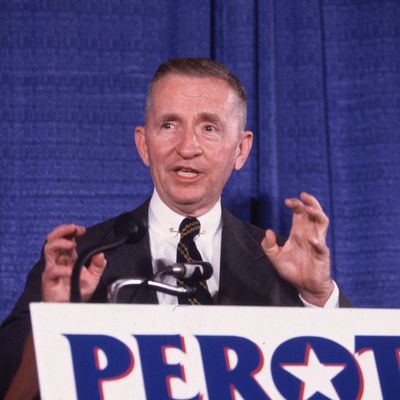
It sometimes seems there is an endless supply of very rich people who believe there’s nothing wrong with U.S. politics and government that their own dominating presence could not fix. Some, like freshly minted 2020 presidential candidate Tom Steyer and the man he seeks to challenge, choose to operate within the two-party system. Others, like Starbucks founder Howard Schultz, think they can break the mold and successfully run for president as an independent. Among this latter group, the most recent exemplar was 1992 and 1996 presidential candidate Ross Perot, who died today at the age of 89.
Perot fit and even shaped the stereotype of the civic-minded if cranky business executive who grew weary of the corruption and incompetence he saw in the political class, and decided to settle some old scores (in his case, with fellow Texan George H.W. Bush, who happened to be the president of the United States) by jumping into the arena himself. By luck or calculation, Perot’s first presidential bender in 1992 coincided with a bad economy, a divided Republican Party, and a Democratic Party that was still trying to find its way after losing five of the six previous elections. With money and determination, Perot managed to pull off the best non-major-party popular-vote performance in a presidential election since Teddy Roosevelt finished second in 1912 on the Progressive ticket. As I noted earlier this year in a meditation of Schultz’s vain presidential ambitions, Perot combined a focus on issues the two major parties were not emphasizing and a flair for media:
Perot … stood clearly for a national emphasis on issues the two major parties were ignoring: a growing national debt and the impact of economic globalization on jobs. As a self-conscious “reformer” he also embraced ideas like free TV time for candidates, shorter election campaigns, and an end to political action committees. What he lacked in specificity he more than overcompensated for with a fascinating mix of folksiness and wonkiness, conveyed through prime-time campaign infomercials that relied on charts and graphs.
Perot ran nine of these infomercials in 1992, including one that ran on all three major networks on Election eve. Some of them got better ratings than sitcoms. Perot was without any question a phenomenon who made an indelible impression at the time.
But Perot the candidate was often his own worst enemy, as one might expect from a man who suggested his campaign theme song ought to be the country classic “Crazy”:
Perot dropped out of the 1992 race — despite leading both Bush and Clinton in the polls for a while — after deciding that Clinton had “revitalized” the Democratic Party, but then dropped back in with just 33 days remaining. He could never make up his mind whether he was a lone wolf or the founder of an enduring political movement; in 1996 he ran as the nominee of the Reform Party, which he created, but was excluded from the presidential debates and got less than half of the votes he had secured in the previous election. He never ran for office again, and returned to his earlier habits as a routine supporter of the GOP.
Perot’s policy legacy is interesting. He was an outspoken critic of free trade, and particularly of NAFTA, which was signed by Bush shortly after the 1992 election, and then embraced by the Clinton administration. Perot famously debated Vice-President Al Gore on NAFTA’s ratification in November of 1993. At the time, most elite observers figured Gore had the better argument and presented it more smoothly. More recently, of course, the GOP under Trump has more or less abandoned free trade generally and the original NAFTA specifically, and the post-Obama Democrats, while critical of Trump’s trade policies, are drifting far from the Clinton-Gore heritage as well.
But Perot’s obsession with fiscal probity and the national debt has not worn well; arguably both parties have tossed out the green eyeshade and embraced routine budget deficits when necessary to achieve their objectives.
And yes, enemies of partisanship will always tout Perot’s relative success in bucking the duopoly. But steadily increasing partisan polarization has all but squeezed the life out of the truly independent share of the electorate that Perot counted on and helped mobilize.
In the end, Ross Perot was very much a creature of his time — a relic of the ’90s, along with grunge music and dial-up internet access. With Donald Trump in the White House, it no longer seems so strange that Perot saw himself as potential president. But he probably was “crazy” to think Americans were ready to abandon the two major parties, with their amazing ability to co-opt or sidetrack unconventional ideas. May he rest in peace.






























